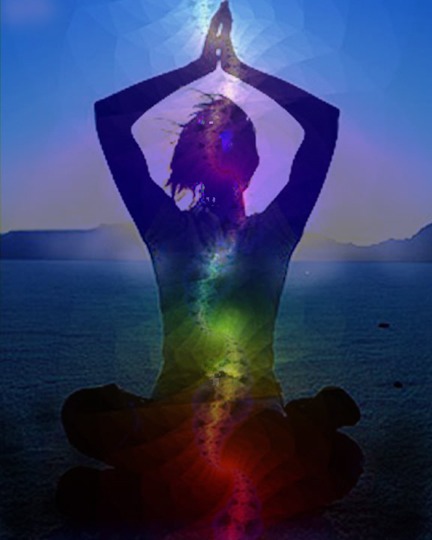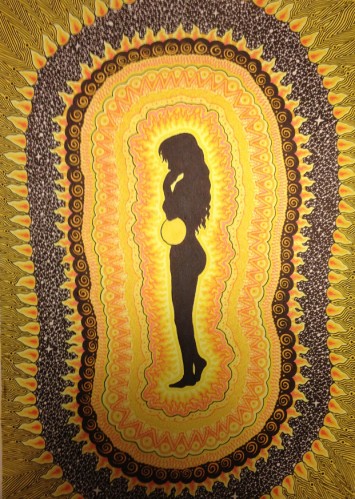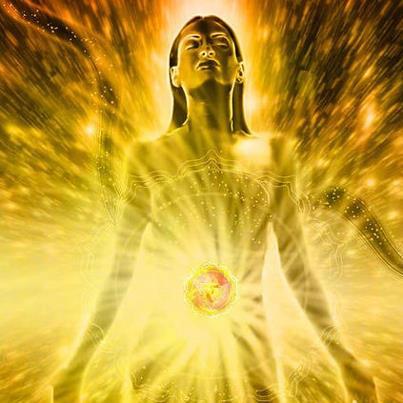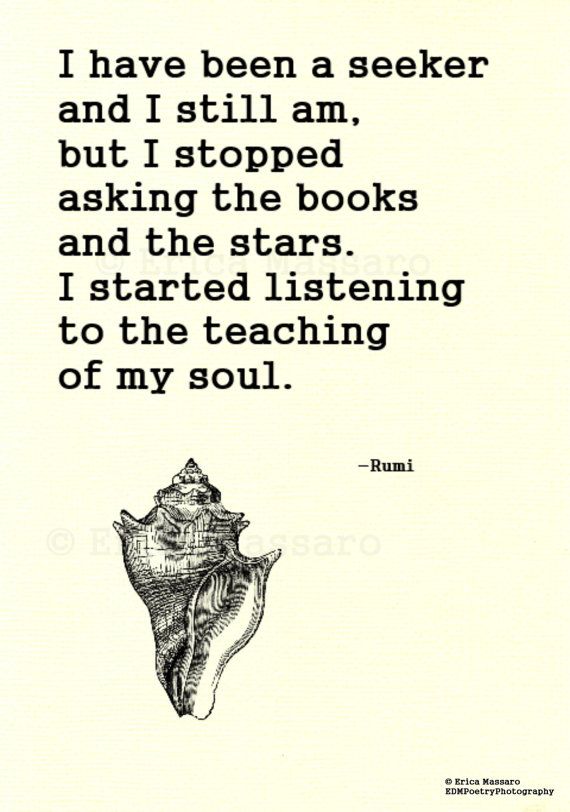As far as we can discern, the sole purpose of human existence is to kindle a light of meaning in the darkness of mere being. C.G. Jung
It’s about 18 months since I penned my first post for Seven Intentions. It was to be an experiment in ‘putting it out there’ to the universe. I joked that I really wasn’t sure what I was putting out where, but it was a shout-out for some kind of sign of life, of intelligence, of connection.
Now, only a blink of a eye later, I wonder what that version of myself would think of this version of myself and her experiences.
In that short space I became a Chakradance facilitator, set up my own studio, and started studies in shamanism, druidry, and nature magic.
I began this blog investigating ideas for ‘putting it out there’ like the ‘Law of Attraction’, vision boards, and the power of wishing.
In truth, as much as I may have been loathe to admit it at the time, I think I was on a quest for happiness and material fulfilment dressed up as a spiritual quest.
I wanted love, real, lasting, deep love, I wanted security, a place of my own, a successful career. I wanted a spiritual connection. You know, the kind of warm, fuzzy spiritual connection that makes you feel really good all the time?
My discovery of Chakradance led me to a technique of inner journeying, which continues to uncover and reveal hidden aspects of myself, as well as producing a connection between my mind, spirit, and body which I have not hitherto experienced. Practising Chakradance has brought me home to my body.
What does that mean? Well, I think I had always felt disconnected to my own body, and quite unhappy with it. It didn’t look the way I thought it should, so I swung between a type of acceptance – that was more of a peaceful truce with my dissatisfaction – and outright self-loathing.
To lose confidence in one’s body is to lose confidence in one’s self. Simone De Beauvoir
Chakradance, through the combination of movement and meditation, allowed me to experience the wonder of my body, as a part of my whole self. it has opened me to a sense of self-worth that I have not experienced before.
This concept of worth has been raising its head over the last week or so.
Well and truly beyond my post-Bali-buzz, life has ramped up to a rather demanding pace, leaving me dragging my heels somewhat.
I had written off my fatigue to the winter blues (or the not-being-in-Bali-anymore blues) until an article on adrenal fatigue popped up on my newsfeed.
Now I’m not being an internet hypochondriac here, I have suffered from adrenal fatigue for a few years and periodically I forget this and push myself far enough that my body has to remind me.
The article was entitled ‘Where’s your pause button?’
It’s a good question. Left to my own devices I’m very good at resting, being naturally lazy it comes, well, naturally to me.
But my life is bigger than me. There are so many competing demands on my time and energy, and I have found myself pushing past my fatigue. And let’s face it, our society is addicted to busy, heaven forbid a healthy person take time to just rest when there are things to be done!
I haven’t been making time for my spiritual practices, I haven’t journeyed in over a week.
On top of feeling stretched to my limits, I also found myself agreeing to do things that really I didn’t need to, things other people could and should take responsibility for.
And then I found myself on the first night of my Chakradance course flustered and flummoxed because two people hadn’t turned up. Were they late? Were they lost? Eventually I started the class without them, but I felt thrown off my game.
As I told my kinesiologist – who has become something of a wise elder – of all my mounting resentments at feeling taken advantage of, he told me I needed to treat myself as something of worth. Rather than always putting other peoples’ wants and needs ahead of my own, I needed to act from a sense of worth.
Until you value yourself, you will not value your time. If you don’t value your time, you won’t do anything with it. M Scott Peck
For example, he suggested I say “No, I won’t do something that someone else should be doing for themselves. No, it’s not okay to waste my time, love, energy or money.”
Hmmmm. I thought. He’s on to something here. Was I getting my self-worth entirely from my sense of doing, of being of service to others? Not that being of service is inherently a bad thing, but if it’s done to feed our own self-esteem, without an acknowledgment of our own needs into the bargain, it can begin to resemble martyrdom more than service.
Self-worth is a characteristic associated with the solar plexus chakra and the corresponding element of fire. Generally, but not always, I find women who come to Chakradance, myself included, have underactive solar plexus energy.
Although the adrenals are generally associated with the base chakra, adrenal fatigue, which is essentially exhaustion due to a chronic over- stimulation of the fight-or-flight response seems to me a nervous issue associated as much with our sense of power (solar plexus) as our sense of security (base chakra.)
Often, women love the sacral Chakradance, all hips and bellies gyrating to the sounds of water flowing, and middle eastern music, but moving from this receptive ‘yin’ energy to the more outgoing ‘yang’ energy of the solar plexus can be like suddenly forgetting how to move, or feeling as if our limbs are made of wood.
Carl Jung poetically describes the journey through the solar plexus thus:
Desire, passions, the whole emotional world breaks loose. Sex, power, every devil in our nature gets loose when we become acquainted with the unconscious… After baptism you get right into hell. And now comes the paradox of the East: it is also the ‘fullness of jewels.’ But what is passion, what are emotions? There is the source of Fire, there is the fullness of energy. A man who is not on fire is nothing, he is ridiculous, he is two-dimensional. He must be on fire, even if he does make a fool of himself. A flame must burn somewhere, otherwise no light shines, there is no warmth, nothing. Carl Jung
Jung focuses on the fiery passion and energy of the solar plexus, our psycho-spiritual fuel. It’s interesting that when I find myself in the martyr role, my fire is doused. Perhaps true self-worth comes from a passionate ‘fire in the belly?’ From exercising the passion, will and power that exemplify the qualities of this chakra.
In Chakradance we use the archetypes of the Warrior and the Servant to connect to the dominant and submissive aspects of this chakra’s energy. The goal is always balance of the two, excessive fire can be as damaging as a dwindling flame. Indeed Jung saw the chakras as symbols where opposing forces of the psyche might be held. (Howard G. Coward)
The image of the Servant is one who squanders all her power for others, while the Warrior stands tall and autonomous, her power strong within, radiating out. Obviously there is a desirable balance between service and autonomy.
These archetypes provide a powerful framework for the concept of self-worth and how it might affect our psycho-spiritual as well as physical health.
But what does self-worth even mean? Is it meaningful? Or is it some New Age hangover from the ‘me’ generation? It always makes me think of that Loreal commercial “because I’m worth it!” (Hence the title!)
So I decided to go in search of self-worth, as a concept that is.
Not surprisingly concepts of self-worth and self-esteem are relatively recent constructs, although not as recent as the Loreal commercials.
Between 700 and 1500 AD the only concepts of ‘self’ referred to in the West was the ‘weak, sinful, crude, selfish’ nature of the human flesh as contrasted with the perfect nature of the human soul.
We are so engaged in doing things to achieve purposes of outer value that we forget the inner value, the rapture associated with being alive, is what it is all about. Joseph Campbell

Joseph Campbell suggested that the concept of an independent, self-directed self didn’t appear until about 800 years ago and has grown in meaning over that time. Originally our sense of self was entirely dictated by the community, religion and government. These days our sense of self is something we are expected to develop ourselves, to know ourselves well enough to self-actualise. (Clayton Tucker-Ladd)
There is evidence that self-worth and self-esteem correlate with all kinds of goodies like health, good relationships and material prosperity.
As such many modern parents try to praise their children excessively, creating a concern that vacuous self-esteem, that is self-worth that is detached from a skill, quality or value, may actually be harmful. So self-worth is much more than a feeling, it must have substance.
Similarly positive affirmations can only improve self-esteem if they are believable, otherwise the disconnect between the affirmation and our self-concept causes more harm than good.
This sense of self seems to be primarily a Western construct. Eastern belief systems tend to focus on the concept of self as an illusion to be transcended.
Some Western thinkers, like shamanic practitioner Christina Pratt, suggest that the problems faced by the Western world, environmental devastation, excesses of wealth and poverty, may be a direct result of seeing self as a distinct entity. In contrast the shamanic perspective sees a web of life, a spirit in all things that unites us all, people, animals, environment in a very interconnected way.
Carl Rogers believed that your sense of self comes in three components, the view you have of yourself (self-image), how much value you place on yourself (self-esteem or self-worth), and what you wish you were (the ideal self).
It has been suggested that the closer the correlation between your ideal self and your self-image, the higher your self-esteem. This can go two ways. First, we could live by a set of ideal values and therefore our self-image and ideal self are similar, or we can set a low standard for our ideal self and make it easy for our self-image to overlap. So self-esteem may not be a reflection of someone’s worth so much as the overlap between their self-image and their self-concept.
So self-worth really equates with how you value yourself. I see self-esteem as slightly different, more to do with how much I like or approve of myself, which may be a reflection of my value and skills, or it may be based on how high my standards are.
I’m sure we have all met people with great self-esteem who to the outsider may seem nothing special. And yet many outstanding people have very low self-esteem.
I am not what happened to me, I am what I choose to become. C.G. Jung
Self-esteem also fluctuates according to the reactions of others, comparison with others, our social roles, and our degree of identification with other people. (Michael Argyle)
I wonder is there a degree of worth and self-worth that we should have just by nature of living?
Many people certainly attribute a great deal of worth to animals, as demonstrated by the public outcry over the death of Cecil the lion this week. Do we afford all life the same degree of worth? Worth is based on value, which is obviously highly subjective.
It seems to me that self-esteem works best in a static environment. I can like myself while I’m achieving goals that meet approval from my peers. But what happens when I veer off that accepted path, and follow a more esoteric pursuit of self-exploration?
I have written much about the highs and low of my quest for spiritual evolution. Whilst I believe it is a worthy pursuit, it is not one that meets with widespread support or approval in our society.
When I chose this path, or it chose me, I’m still not sure which way it went, I stepped outside of the trajectory I was on. A trajectory based on material success and comfort and approval from my community.
Instead of taking the promotion at work, I went part time and started a business, which although it brings me, and hopefully others, much worth, did not impress my family or peers much in terms of the material success it would bring. I have spent a reasonable chunk of money studying shamanism, and again people ask me what the monetary return will be on that and I don’t know. Possibly none. The non-material returns have been inestimable.
At times my self-esteem has plummeted. There has been an awful lot of wailing and gnashing of teeth and asking “what am I doing with my life?”
And yet, there is a sense of value, of following a higher calling than the material, or the acceptance of society. And I think that has a lot to do with self-worth. Because at the end of all this, I don’t expect any rewards other that to have truly known myself, to have faced my shadow, and to have explored my soul as best as my limited time here will allow. It’s not glamorous, sometimes this way of life seems to involve a lot of snot-crying whilst curled up in a foetal position.
Following the framework of the chakra system, the next step from here is the heart, Anahata chakra. Here Jung said that “the contact with the sun in Manipura lifts you up off your feet into the sphere above the earth.” In the heart chakra our yin and yang energies meet and the process of integration, balance and individuation begins.
Crossing from Manipura to Anahata is quite difficult because the recognition that the psyche acts on its own, that it really is something other than yourself, is extraordinarily hard to realise and admit. Carl Jung
Jung describes the journey through Manipura as a kind of rebirth. Here after wading through the waters of our unconscious in the sacral chakra, we find ourselves in a fiery mix of shadow and light, emotions and passions. The fire can be overwhelming, in fact it must be overwhelming in order to engulf the ego. Like the Phoenix from the ashes we emerge reborn from the flames.
It’s terribly esoteric isn’t it? But what does all that mean in a practical sense?
I guess, for me, this emergence out of the sea of unconscious back into daylight has brought with it a certain tension. As illustrated by the archetypes of the Servant and the Warrior I’m finding myself having to make choices about how I invest myself in the world.
My Servant aspect would have me submit to the outside demands of society. But what are they? It’s a real mix to be honest. On the one hand there is a certain work and family ethic that dictates a degree of submission to helping and supporting others, to responsibility.
On the other extreme, there’s the whole “because I’m worth it” school of thought (if you can call it that) suggesting I should pamper myself, put myself first, treat myself like the ‘goddess’ that I am. Which again has a place in a balanced self-esteem, but in extreme leads to narcissism.
There’s no coming to consciousness without pain. C.G. Jung
What about the Warrior archetype? Honestly this one comes least naturally to me, and I think to many people. We are so out of touch with our Warriors. Outside of sport and war, where does anyone get to be a Warrior in modern society? We are so bound and contained by laws and ethics and even more by political correctness, by what we can and can’t say. Our Warrior just gets beaten down.
Chakradance, or any shamanic dance practice allows us to embody this archetype and by doing so, enables the power associated with our Warrior archetype to flow in.
As I said many women who try Chakradance report a resistance in the solar plexus chakra. Yet over time I have witnessed myself and others shift into an embodiment of the Warrior energy.
So what? You might say. Well, to me life follows consciousness. If we can embody this archetype through dance and release it’s power, that power will flow out into our lives.
Most tribal cultures had hunting dances and war dances to raise this kind of power before they went hunting and fighting, so it’s not a new idea to use dance and music to raise these energies.
What is new is a culture where we force ourselves to trudge day after day through activities out of sheer obligation, without any real will or passion, and without any sense of how to manage our own power.
So if the qualities of the solar plexus are will and power, perhaps self-worth comes from exercising these qualities according to our values?
And really, who had more to say about will and power than Fredrich Nietzsche?
So I asked my friend Finn McMillan, a Gnostic Shamanry practitioner, who is well versed in old Fred, whether he thought that self-worth and Nietzsche’s concept of ‘will to power’ were related. After somewhat of a ‘duh!’ moment when he realised yet again that not everyone is as well read as him, he came out with this gem:
You cannot have any meaningful self-worth without the capacity to exercise power, and you can’t exercise power without enough self-worth to act as a ‘container’ for it. Finn McMillan
Ah! Self-worth as a container. Perhaps we are all born with a ‘container’ for self-worth, but it is reliant on our learning to manage our own will and power. And the cycle flows from there.
What kind of container would this be? Obviously not a physical one, it must be a kind of psychic container, or a blueprint ready to be activated by exercising our power. Jung called the chakras psychical localizations. This ‘container’ concept ties in with the Celtic energy centres, or cauldrons, which I discussed in a previous post here.
Nietzsche saw the will to power as the basic driving force of evolution. Jung saw the solar plexus chakra as the symbol of the evolution from purely physical and unconscious psyche into consciousness. Consciousness is a necessity for will and exercising power. Then the will to power could be seen as the evolutionary force behind consciousness.
Like the image of the chakras as a spinning wheel, this cycle of integral components feed, contain and propel each other. Consciousness seeks power, power seeks consciousness, self-worth becomes the necessary ingredient to advance the conscious awareness of the precious nature of this evolutionary process.
Self-worth then may be far more meaningful than I had realised. It may be the very thing that propels us to do the work of the soul.
Ah! There is much more to ponder here. Much left to unfold. But for now I will leave you with some Rumi.
Blessings.








